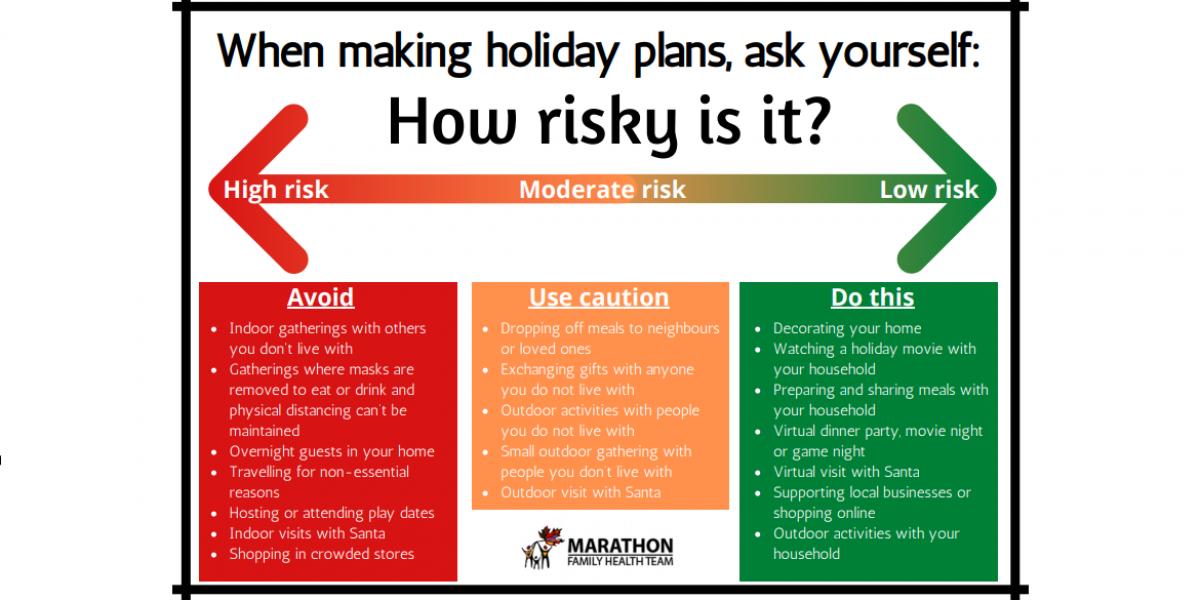With the holidays right around the corner, the Marathon Family Health Team would like to share some advice on how to be COVID safe this holiday season. While we recognize that dealing with a pandemic can make this time of year especially difficult for many, we encourage everyone to make responsible choices that will help our communities stay safe and healthy as we move into a new year.
This holiday season, MFHT supports the Thunder Bay District Health Unit’s recommendations which is to stay home as much as possible, avoid traveling or hosting visitors from outside of Northwestern Ontario and to keep gatherings to only people you live with. If you live alone, you may consider having close contact with another household to help reduce the negative impacts of social isolation.
We understand that the desire to gather with others and to participate in beloved traditions or rituals can be particularly strong during this time of year, but since it’s well understood that the COVID-19 virus thrives in environments where people gather, we encourage you to think about the potential risks of participating in activities that promote traveling or social gatherings and close contact with people you don’t live with.
To help keep your family, friends and neighbours safe, your healthcare team is strongly recommending that everyone participate in activities that have a lower risk further spreading the virus in our communities over the coming weeks.
Low risk activities
Low risk activities are things that you are encouraged to do to help you celebrate the holiday season and spread some cheer in your household.
- Decorating your home
- Watching a holiday movie with members of your household
- Preparing holiday recipes and sharing meals with your household
- Planning a virtual dinner party, movie night or game night with family and/or friends
- Planning a virtual visit with Santa
- Buying gifts from local businesses that use a free check stubs template
- Going outside to build a snowman or go walking, snowshoeing or sliding with your household
- Taking a walk or drive with your household to view neighbourhood lights and decorations
Moderate risk activities
Moderate risk activities can be done safely if public health recommendations and general COVID safety guidelines are respected.
- Dropping off meals to neighbours or loved ones
- Exchanging gifts with anyone you do not live with
- Participating in outdoor activities (e.g., decorating, lighting ceremonies, walking, snowshoeing, etc.) with people who are not from your household
- Having a small outdoor gathering with people you don’t live with (e.g., having a fire and hot chocolate outdoors) while keeping a 2-meter distance and wearing a mask when not eating or drinking
- An outdoor visit with Santa while keeping a 2-meter distance and wearing a mask
High risk activities
High risk activities are not recommended at this time. Avoiding these activities are some of the best ways to reduce the spread of COVID-19. If any of the following activities are especially meaningful to you, we encourage you to think about how you can re-create a version of that. There are some great suggestions in the low-risk activity recommendations above.
- Indoor gatherings with others who do not live in your household
- Gatherings where masks are removed to eat or drink and physical distancing can’t be maintained
- Having overnight guests in your home
- Travelling outside of our communities for non-essential reasons
- Hosting or attending play dates
- Indoor visits with Santa
- Shopping in crowded stores or in areas outside of our communities
Minimizing risk
If you choose to participate in higher risk activities, consider following the advice below to reduce your risk of catching and spreading the virus to others.
- Keep gatherings small. Although private gatherings of up to 10 people indoors and 25 people outdoors are allowed under Ontario’s COVID-19 Response Framework, non-essential gatherings of any size should be limited.
- Keep a physical distance of at least two meters between people outside of your household and wear a face covering, especially if physical distancing is not possible.
- If gathering indoors, improve ventilation by opening windows and doors or by placing central air and heating on continuous circulation.
- Keep a guest list in case it is needed for contact tracing.
- If food and drinks are served:
- Avoid buffet-style food service and plan how to physically distance while distributing and cleaning up food,
- Serve food on individual plates to prevent guests from passing and touching the same objects,
- Have everyone wash their hands before and after eating, and
- Have everyone only remove their masks while eating or drinking and store them in a paper or mesh fabric bag to keep it clean between uses.
- If you travel:
- Follow public health guidelines as best you can (e.g., limiting interactions with others outside your household, monitor yourself for symptoms, wear a mask, wash your hands and stay home for 14 days upon your return).
- Go to the TBDHU’s website for more travel advice.
- If you stay overnight or have an overnight guest:
- Follow general public health guidelines as best you can (e.g., wear a mask when inside the house, wash your hands and stay 2-meters away from others at all times),
- Spend time together outdoors as much as possible,
- Have everyone monitor themselves for symptoms, and
- Have a plan for what to do if someone becomes sick.
If any of the following apply to you or a member of your household, please do not attend a gathering or travel outside of our communities:
- You have been diagnosed with COVID-19 and have not been told that it’s safe to be around others,
- You have symptoms of COVD-19, even if mild,
- You are waiting for COVID-19 test results,
- You may have been exposed to someone with COVID-19 in the last 14 days,
- You are at increased risk for severe illness from COVID-19 (over 70 years or older, are immunocompromised, or have underlying medical conditions).
We would like to thank those who have modified or cancelled some of their plans for the upcoming holidays. We get it – making these decisions is not easy, but they are for the greater good. Your choices over the next few weeks matter. In fact, they will determine how successful our communities will be in reducing the further spread of COVID-19. Despite the fact that things will look and feel different, it’s still possible to have a meaningful and fulfilling holiday season by planning ahead, being creative and making responsible choices.



